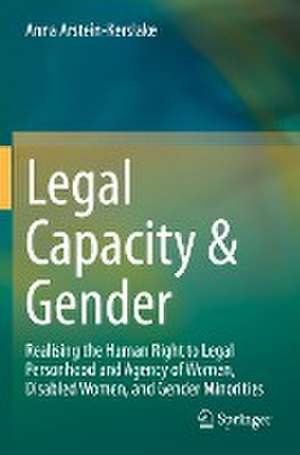Legal Capacity & Gender: Realising the Human Right to Legal Personhood and Agency of Women, Disabled Women, and Gender Minorities
Autor Anna Arstein-Kerslakeen Limba Engleză Paperback – 27 ian 2022
| Toate formatele și edițiile | Preț | Express |
|---|---|---|
| Paperback (1) | 884.22 lei 6-8 săpt. | |
| Springer International Publishing – 27 ian 2022 | 884.22 lei 6-8 săpt. | |
| Hardback (1) | 890.06 lei 6-8 săpt. | |
| Springer International Publishing – 26 ian 2021 | 890.06 lei 6-8 săpt. |
Preț: 884.22 lei
Preț vechi: 1078.31 lei
-18% Nou
Puncte Express: 1326
Preț estimativ în valută:
169.20€ • 177.10$ • 140.82£
169.20€ • 177.10$ • 140.82£
Carte tipărită la comandă
Livrare economică 31 martie-14 aprilie
Preluare comenzi: 021 569.72.76
Specificații
ISBN-13: 9783030634957
ISBN-10: 3030634957
Ilustrații: XV, 153 p. 1 illus.
Dimensiuni: 155 x 235 mm
Greutate: 0.25 kg
Ediția:1st ed. 2021
Editura: Springer International Publishing
Colecția Springer
Locul publicării:Cham, Switzerland
ISBN-10: 3030634957
Ilustrații: XV, 153 p. 1 illus.
Dimensiuni: 155 x 235 mm
Greutate: 0.25 kg
Ediția:1st ed. 2021
Editura: Springer International Publishing
Colecția Springer
Locul publicării:Cham, Switzerland
Cuprins
1. Right to legal capacity: Debates and legal argument.- 2. Personhood: perspectives from critical feminist, disability and queer studies.- 3. Gender, disability & decision-making: Historical discrimination.- 4. Gendered denials: Law, policy and practice.- 5. Vulnerability created by legal capacity denials.- 6. Creating change: Examples of modern reform and recommendations.
Notă biografică
Dr Anna Arstein-Kerslake is an Associate Professor at Melbourne Law School. She is the author of one of the first books on the right to legal capacity, Restoring Voice to People with Cognitive Disabilities (Cambridge University Press, 2017). She supported the United Nations Committee on the Rights of Persons with Disabilities in the drafting of their general comment on the right to equal recognition before the law and she has worked with domestic and international bodies around the world on law and policy reform towards the realisation of the right to legal capacity.
Textul de pe ultima copertă
This book explores the role of gender in the recognition of an individual’s legal capacity. It discusses the meaning of the right to legal capacity and its two core elements – legal personhood and legal agency. It then analyses historical and modern denials of personhood and agency experienced by women, disabled women, and gender minorities – for example, prohibitions from voting, limitations on contracting, loss of personhood upon marriage, and gender binary requirements leading to an inability to exercise legal capacity, amoung others.
Using critical feminist, disability, and queer theory, this book also offers insights into the construction of legal personhood and its role as a predictor of power and privilege. The book identifies patterns of oppression through legal capacity denial in various jurisdictions and discusses situations in which modern law continues to enforce these denials. In addition, the book presents solutions: it identifies practices to learn from in various jurisdictions around the world – including both civil law and common law jurisdictions. It also uses case studies to illustrate the ways in which existing laws, policies and practices could be reformed. As such, the book offers both a novel contribution to the field of legal capacity law and a tool for creating change and helping to realise the right to legal capacity for all.
Using critical feminist, disability, and queer theory, this book also offers insights into the construction of legal personhood and its role as a predictor of power and privilege. The book identifies patterns of oppression through legal capacity denial in various jurisdictions and discusses situations in which modern law continues to enforce these denials. In addition, the book presents solutions: it identifies practices to learn from in various jurisdictions around the world – including both civil law and common law jurisdictions. It also uses case studies to illustrate the ways in which existing laws, policies and practices could be reformed. As such, the book offers both a novel contribution to the field of legal capacity law and a tool for creating change and helping to realise the right to legal capacity for all.
Caracteristici
Provides an overview of current interpretations of the right to legal capacity Discusses theories of personhood from critical feminist, disability, and queer theory Includes a chapter on good practice in the protection of the right to legal capacity for women, disabled women, and gender minorities Recommends concrete guidance for reform to secure the right to legal capacity for all
